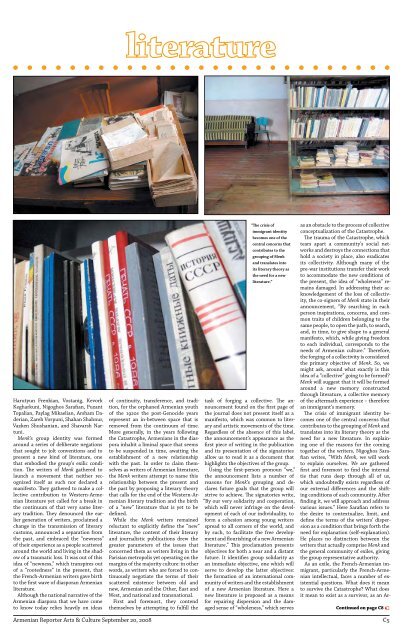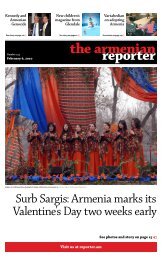Leo Chaloukian: All the way to Tinseltown - Armenian Reporter
Leo Chaloukian: All the way to Tinseltown - Armenian Reporter
Leo Chaloukian: All the way to Tinseltown - Armenian Reporter
You also want an ePaper? Increase the reach of your titles
YUMPU automatically turns print PDFs into web optimized ePapers that Google loves.
Harutyun Frenkian, Vostanig, Kevork<br />
Kegharkuni, Nigoghos Sarafian, Puzant<br />
Topalian, Paylag Mikaelian, Arsham Daderian,<br />
Zareh Vorpuni, Shahan Shahnur,<br />
Vazken Shushanian, and Shavarsh Nartuni.<br />
Menk’s group identity was formed<br />
around a series of deliberate negations<br />
that sought <strong>to</strong> jolt conventions and <strong>to</strong><br />
present a new kind of literature, one<br />
that embodied <strong>the</strong> group’s exilic condition.<br />
The writers of Menk ga<strong>the</strong>red <strong>to</strong><br />
launch a movement that nei<strong>the</strong>r recognized<br />
itself as such nor declared a<br />
manifes<strong>to</strong>. They ga<strong>the</strong>red <strong>to</strong> make a collective<br />
contribution <strong>to</strong> Western-<strong>Armenian</strong><br />
literature yet called for a break in<br />
<strong>the</strong> continuum of that very same literary<br />
tradition. They denounced <strong>the</strong> earlier<br />
generation of writers, proclaimed a<br />
change in <strong>the</strong> transmission of literary<br />
cus<strong>to</strong>ms, announced a separation from<br />
<strong>the</strong> past, and embraced <strong>the</strong> “newness”<br />
of <strong>the</strong>ir experience as a people scattered<br />
around <strong>the</strong> world and living in <strong>the</strong> shadow<br />
of a traumatic loss. It was out of this<br />
idea of “newness,” which transpires out<br />
of a “rootedness” in <strong>the</strong> present, that<br />
<strong>the</strong> French-<strong>Armenian</strong> writers gave birth<br />
<strong>to</strong> <strong>the</strong> first wave of diasporan <strong>Armenian</strong><br />
literature.<br />
Although <strong>the</strong> national narrative of <strong>the</strong><br />
<strong>Armenian</strong> diaspora that we have come<br />
<strong>to</strong> know <strong>to</strong>day relies heavily on ideas<br />
of continuity, transference, and tradition,<br />
for <strong>the</strong> orphaned <strong>Armenian</strong> youth<br />
of <strong>the</strong> 1920s <strong>the</strong> post-Genocide years<br />
represent an in-between space that is<br />
removed from <strong>the</strong> continuum of time.<br />
More generally, in <strong>the</strong> years following<br />
<strong>the</strong> Catastrophe, <strong>Armenian</strong>s in <strong>the</strong> diaspora<br />
inhabit a liminal space that seems<br />
<strong>to</strong> be suspended in time, awaiting <strong>the</strong><br />
establishment of a new relationship<br />
with <strong>the</strong> past. In order <strong>to</strong> claim <strong>the</strong>mselves<br />
as writers of <strong>Armenian</strong> literature,<br />
<strong>the</strong> Menk writers attempt <strong>to</strong> name this<br />
relationship between <strong>the</strong> present and<br />
<strong>the</strong> past by proposing a literary <strong>the</strong>ory<br />
that calls for <strong>the</strong> end of <strong>the</strong> Western-<strong>Armenian</strong><br />
literary tradition and <strong>the</strong> birth<br />
of a “new” literature that is yet <strong>to</strong> be<br />
defined.<br />
While <strong>the</strong> Menk writers remained<br />
reluctant <strong>to</strong> explicitly define <strong>the</strong> “new”<br />
literature, <strong>the</strong> content of <strong>the</strong>ir literary<br />
and journalistic publications drew <strong>the</strong><br />
greater parameters of <strong>the</strong> issues that<br />
concerned <strong>the</strong>m as writers living in <strong>the</strong><br />
Parisian metropolis yet operating on <strong>the</strong><br />
margins of <strong>the</strong> majority culture: in o<strong>the</strong>r<br />
words, as writers who are forced <strong>to</strong> continuously<br />
negotiate <strong>the</strong> terms of <strong>the</strong>ir<br />
scattered existence between old and<br />
new, <strong>Armenian</strong> and <strong>the</strong> O<strong>the</strong>r, East and<br />
West, and national and transnational.<br />
First and foremost, <strong>the</strong>y contend<br />
<strong>the</strong>mselves by attempting <strong>to</strong> fulfill <strong>the</strong><br />
“The crisis of<br />
immigrant identity<br />
becomes one of <strong>the</strong><br />
central concerns that<br />
contributes <strong>to</strong> <strong>the</strong><br />
grouping of Menk<br />
and translates in<strong>to</strong><br />
its literary <strong>the</strong>ory as<br />
<strong>the</strong> need for a new<br />
literature.”<br />
task of forging a collective. The announcement<br />
found on <strong>the</strong> first page of<br />
<strong>the</strong> journal does not present itself as a<br />
manifes<strong>to</strong>, which was common <strong>to</strong> literary<br />
and artistic movements of <strong>the</strong> time.<br />
Regardless of <strong>the</strong> absence of this label,<br />
<strong>the</strong> announcement’s appearance as <strong>the</strong><br />
first piece of writing in <strong>the</strong> publication<br />
and its presentation of <strong>the</strong> signa<strong>to</strong>ries<br />
allow us <strong>to</strong> read it as a document that<br />
highlights <strong>the</strong> objectives of <strong>the</strong> group.<br />
Using <strong>the</strong> first-person pronoun “we,”<br />
<strong>the</strong> announcement lists a number of<br />
reasons for Menk’s grouping and declares<br />
future goals that <strong>the</strong> group will<br />
strive <strong>to</strong> achieve. The signa<strong>to</strong>ries write,<br />
“By our very solidarity and cooperation,<br />
which will never infringe on <strong>the</strong> development<br />
of each of our individuality, <strong>to</strong><br />
form a cohesion among young writers<br />
spread <strong>to</strong> all corners of <strong>the</strong> world, and<br />
by such, <strong>to</strong> facilitate <strong>the</strong> free development<br />
and flourishing of a new <strong>Armenian</strong><br />
literature.” This proclamation presents<br />
objectives for both a near and a distant<br />
future. It identifies group solidarity as<br />
an immediate objective, one which will<br />
serve <strong>to</strong> develop <strong>the</strong> latter objectives:<br />
<strong>the</strong> formation of an international community<br />
of writers and <strong>the</strong> establishment<br />
of a new <strong>Armenian</strong> literature. Here a<br />
new literature is proposed as a means<br />
for repairing dispersion and <strong>the</strong> damaged<br />
sense of “wholeness,” which serves<br />
as an obstacle <strong>to</strong> <strong>the</strong> process of collective<br />
conceptualization of <strong>the</strong> Catastrophe.<br />
The trauma of <strong>the</strong> Catastrophe, which<br />
tears apart a community’s social networks<br />
and destroys <strong>the</strong> connections that<br />
hold a society in place, also eradicates<br />
its collectivity. Although many of <strong>the</strong><br />
pre-war institutions transfer <strong>the</strong>ir work<br />
<strong>to</strong> accommodate <strong>the</strong> new conditions of<br />
<strong>the</strong> present, <strong>the</strong> idea of “wholeness” remains<br />
damaged. In addressing <strong>the</strong>ir acknowledgement<br />
of <strong>the</strong> loss of collectivity,<br />
<strong>the</strong> co-signers of Menk state in <strong>the</strong>ir<br />
announcement, “By searching in each<br />
person inspirations, concerns, and common<br />
traits of children belonging <strong>to</strong> <strong>the</strong><br />
same people, <strong>to</strong> open <strong>the</strong> path, <strong>to</strong> search,<br />
and, in time, <strong>to</strong> give shape <strong>to</strong> a general<br />
manifes<strong>to</strong>, which, while giving freedom<br />
<strong>to</strong> each individual, corresponds <strong>to</strong> <strong>the</strong><br />
needs of <strong>Armenian</strong> culture.” Therefore,<br />
<strong>the</strong> forging of a collectivity is considered<br />
<strong>the</strong> primary objective of Menk. So, we<br />
might ask, around what exactly is this<br />
idea of a “collective” going <strong>to</strong> be formed?<br />
Menk will suggest that it will be formed<br />
around a new memory constructed<br />
through literature, a collective memory<br />
of <strong>the</strong> aftermath experience – <strong>the</strong>refore<br />
an immigrant’s memory.<br />
The crisis of immigrant identity becomes<br />
one of <strong>the</strong> central concerns that<br />
contributes <strong>to</strong> <strong>the</strong> grouping of Menk and<br />
translates in<strong>to</strong> its literary <strong>the</strong>ory as <strong>the</strong><br />
need for a new literature. In explaining<br />
one of <strong>the</strong> reasons for <strong>the</strong> coming<br />
<strong>to</strong>ge<strong>the</strong>r of <strong>the</strong> writers, Nigoghos Sarafian<br />
writes, “With Menk, we will work<br />
<strong>to</strong> explain ourselves. We are ga<strong>the</strong>red<br />
first and foremost <strong>to</strong> find <strong>the</strong> internal<br />
tie that runs deep through all of us,<br />
which undoubtedly exists regardless of<br />
our external differences and <strong>the</strong> shifting<br />
conditions of each community. After<br />
finding it, we will approach and address<br />
various issues.” Here Sarafian refers <strong>to</strong><br />
<strong>the</strong> desire <strong>to</strong> contextualize, limit, and<br />
define <strong>the</strong> terms of <strong>the</strong> writers’ dispersion<br />
as a condition that brings forth <strong>the</strong><br />
need for explanation (self-explanation).<br />
He places no distinction between <strong>the</strong><br />
writers that actually comprise Menk and<br />
<strong>the</strong> general community of exiles, giving<br />
<strong>the</strong> group representative authority.<br />
As an exile, <strong>the</strong> French-<strong>Armenian</strong> immigrant,<br />
particularly <strong>the</strong> French-<strong>Armenian</strong><br />
intellectual, faces a number of existential<br />
questions. What does it mean<br />
<strong>to</strong> survive <strong>the</strong> Catastrophe? What does<br />
it mean <strong>to</strong> exist as a survivor, as an Ar-<br />
Continued on page C8 m<br />
<strong>Armenian</strong> <strong>Reporter</strong> Arts & Culture September 20, 2008<br />
C5

















